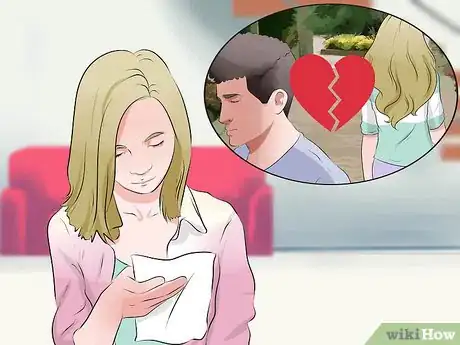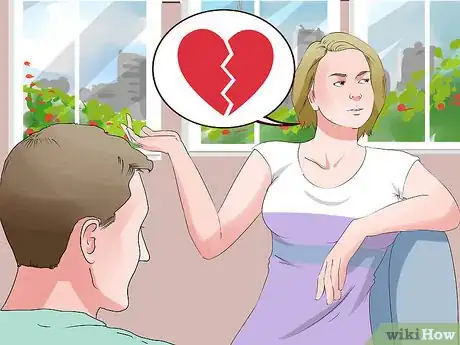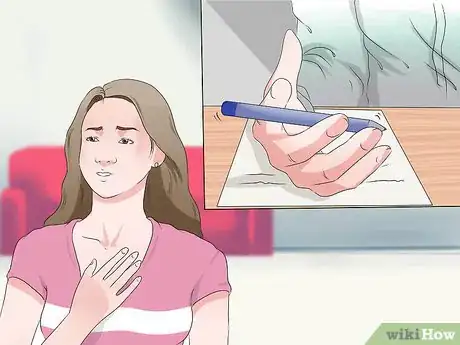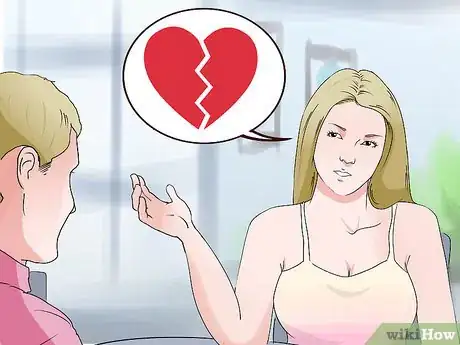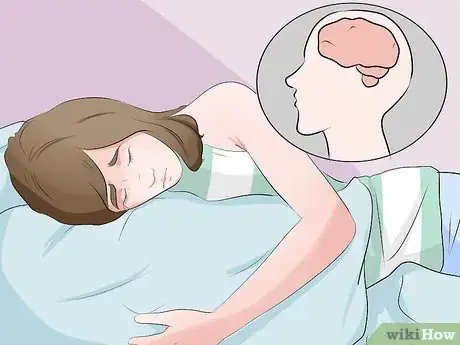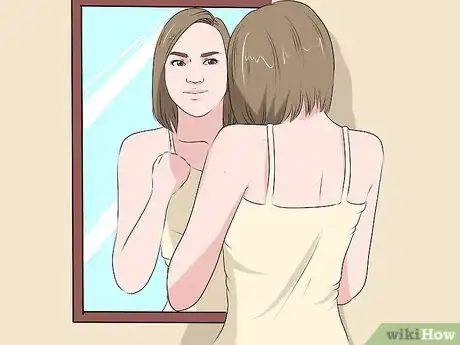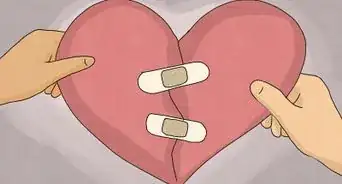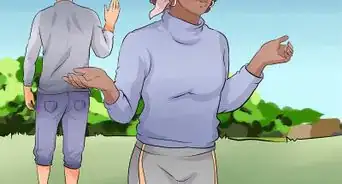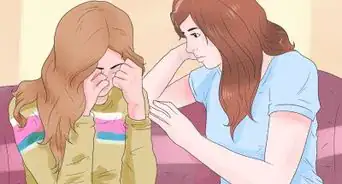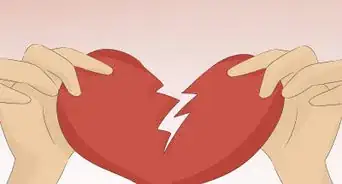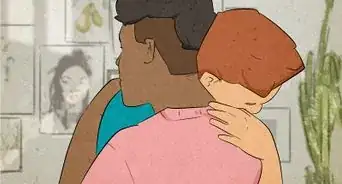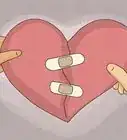This article was co-authored by Sarah Schewitz, PsyD. Sarah Schewitz, Psy.D. is a licensed clinical psychologist by the California Board of Psychology with over 10 years of experience. She received her Psy.D. from the Florida Institute of Technology in 2011. She is the founder of Couples Learn, an online psychology practice helping couples and individuals improve and change their patterns in love and relationships.
wikiHow marks an article as reader-approved once it receives enough positive feedback. In this case, several readers have written to tell us that this article was helpful to them, earning it our reader-approved status.
This article has been viewed 194,824 times.
While break-ups are best done face-to-face, sometimes a letter is needed for a variety of factors. The protocol for writing a break-up letter isn't all that different than the rules for break-ups in general. Be kind, but also be clear the relationship is over and be honest about the reasons you want to end things.
Steps
Deciding on a Letter
-
1Figure out if a letter is the best means for breaking up. When it comes to break ups, face-to-face interaction is optimal but there are a variety of reasons why writing a letter might be the best option.
- If you're in a long distance relationship, communication can sometimes be difficult even over a phone or web cam screen. Some people are also simply uncomfortable with phone calls and if that's the case for you, a letter might help you get your words out in a calm, straightforward fashion.[1]
- If your partner might become hostile or emotional during a face-to-face break up, preventing you from explaining your point of view, a letter might also be a better option. Closure and open communication is important for a clean, healthy breakup and if you don't think your partner will allow this face-to-face, it may be better to write your thoughts out in a letter.[2]
- If you've only been together for a short time, like a month, then you can probably use a letter. [3]
-
2Consider other options. A breakup letter should only be used as a last resort. Unless you're experiencing one of the extenuating circumstances from above, it's better to try and communicate face-to-face.
- Face-to-face communication is ideal because non-verbal cues can provide comfort during a breakup. A smile or hug, for example, can tell your partner he or she still matters even though the relationship is ending. Such moments are absent when breaking up happens in letter form.[4]
- A breakup letter can also be somewhat cryptic. If there's anything your partner does not understand, he or she will be unable to ask for clarification. A lack of closure can leave him or her emotionally scarred and entering a new relationship may be difficult.[5]
- If you truly feel a breakup letter is the best route despite its drawbacks, leave room open for communication. Tell your partner he or she can call you or see you in a few days or weeks to talk if he or she needs to do so face-to-face. Give him or her time to cool down, however, so you can both talk calmly as adults.
Advertisement -
3Decide how to deliver the letter. Delivery options are important in regard to a break-up letter. You want to make sure you deliver the letter in a way that does not come off as cruel or spiteful.
- E-mail, Facebook, and other electronic means of delivering the letter are probably a bad idea. As some many people now have smart phones, that means all day internet access. You do not want your partner to open the e-mail on his way to work, school, or any event where he needs to stay focused.
- Mailing the letter may be necessary if you're in a long distance relationship. However, give some kind of heads up. Do not pretend things are normal after you've sent the letter. Give your partner a heads-up to expect a letter and tell him or her you've expressed some things you feel are easier to discuss in a written format.
- If you live in the same town, you could deliver the letter yourself or have a friend or family member do so.
Writing the Letter
-
1Be honest about the letter's intent. A break-up should be a clean break with no room for ambiguity. You should be honest from the get-go you want to end the relationship.
- The letter's intent should be obvious from the opening line. Easing someone into a break-up seems less cruel, but it actually comes off as a mixed message. It can easily be read as uncertainty, making your partner think there's a chance you might change your mind.[6]
- Your opening line should be concise. Begin with a simple sentence that communicates the letter's intent. Something like, "I have come to the difficult decision to end this relationship" or something along those lines works. This comes off as certain, leaving no room for confusion.[7]
-
2Explain specifics. Breakups can be difficult and cause a lot of feelings of failure and anxiety for both parties. Open communication is important as it removes the stress of not knowing. Your partner deserves to understand why the relationship ended, so providing specifics as to why you feel things aren't working out is vital to a break-up letter.
- Information-sharing is an important aspect of any relationship. In a breakup, sharing the reasons you feel the relationship should end conveys you respect your partner and want him or her to have closure. The idea of a winner (you, as you're leaving) and a loser (your partner, as he's being left) are diminished if you're honest. The blame is not on one individual but rather the incompatibility between the two of you.[8]
- Even if your partner did something that made you unhappy, avoid name-calling and blaming. Simply state the specific behavior that resulted in incompatibility. Instead of saying, "Your friendship with your ex is damaging to our relationship" try to state it in a way that focuses on your personal feelings rather than applying objective facts. For example, "The fact you and Jane are still so close makes me feel it would be difficult for me to trust you longterm."[9]
- Specific behaviors that were damaging to your relationship are important for your ex to know. He or she can use this information to improve his romantic relationships in the future. If you phrase things in a non-confrontational way, it may be helpful for him of her in the future to know why a past relationship ended.[10]
- Remember, it's not always something the other person is doing. Sometimes, incompatibility causes a relationship to end. If this is the case, say so. This is often easier to accept and your ex will not end up feeling bad or guilty about past mistakes. Say something like, "I feel that we ultimately want to end up in different locations and as I'm getting older, I want to find someone I'm compatible with in the longterm."[11]
-
3Be kind. Remember, as you're not face-to-face the non-verbal cues that can be reassuring are absent. Kindness is important in a break-up letter. You want your partner to understand that, even though the relationship has ended, they still matter.
- While you need to be firm that you're ending the relationship, there's no need to be spiteful or aggressive while doing so. Even if you do have feelings of resentment, expressing yourself is an aggressive way could lead your ex to retaliate with his own letter or an angry phone call.
- End the letter by saying something positive, like "I valued the time we spent together and I hope you find someone you work better with in the future." The absence of non-verbal cues can make you come off as cold, so you want your ex to feel that you do care and that he or she is valued even though the relationship is over.
- Another reasons kindness is important is that letters bind you to your words. In anger or sadness, we often say things we do not truly mean and you do not want you or your ex to carry around physical evidence of a regrettable phrasing or tone.
Coping Afterwards
-
1Give yourself time to grieve. When a relationship ends, it's important not to deny or minimize the feelings of sadness that follow.[12] You need to experience your breakup in order to get over it.
- Grieving is a normal part of a relationship ending. Even if you know the decision was for the best, you will likely miss your partner in the days and weeks that follow the breakup.[13]
- Many people deal with such feelings by avoiding them. People may take up a big project or start socializing or drinking heavily. However, this is not a good idea. Ending a relationship, especially a serious and longterm one, is one of the most difficult emotional blows a person can endure in life. You need to be able to accept and face the pain to process the emotions you're feeling about the loss.[14]
-
2Understand biology plays a role in breakups. Biology plays a factor in how we cope with breakups. Understanding your biological functions in the wake of a failed romance can help you better cope.
- The human brain is wired for bonding, so the breaking of any bond is emotionally difficult. A breakup can be similar to drug withdrawal as the feelings of longing for another person remain even weeks after the relationship has ended. Areas of the brain associated with drug use are activated during romantic relationships, and so you're biologically wired to miss someone and feel regret or loneliness in the direct aftermath of a breakup.[15]
- Understand such feelings are temporary and, as time passes, they will lessen. While past relationships do affect how you function in current relationship, the acute feelings of pain lose intensity with time.[16]
-
3Resist negative feelings. Oftentimes, in order to justify or dismiss a relationship, people indulge in ruminating over things they disliked about an ex. Such negative thoughts do not help you get over someone. They simply increase the amount of time you spend thinking about an ex, prolonging the process of getting over someone. Instead, try to focus on the positives and look towards better prospects in the future.[17]
References
- ↑ https://www.psychologytoday.com/articles/201012/the-thoroughly-modern-guide-breakups
- ↑ https://www.psychologytoday.com/articles/201012/the-thoroughly-modern-guide-breakups
- ↑ Sarah Schewitz, PsyD. Licensed Clinical Psychologist. Expert Interview. 15 April 2019.
- ↑ https://www.psychologytoday.com/articles/201012/the-thoroughly-modern-guide-breakups
- ↑ https://www.psychologytoday.com/articles/201012/the-thoroughly-modern-guide-breakups
- ↑ https://www.psychologytoday.com/blog/resolution-not-conflict/201201/breaking-is-hard-do-so-heres-6-step-how
- ↑ https://www.psychologytoday.com/blog/resolution-not-conflict/201201/breaking-is-hard-do-so-heres-6-step-how
- ↑ https://www.psychologytoday.com/blog/resolution-not-conflict/201201/breaking-is-hard-do-so-heres-6-step-how
- ↑ https://www.psychologytoday.com/blog/resolution-not-conflict/201201/breaking-is-hard-do-so-heres-6-step-how
- ↑ https://www.psychologytoday.com/blog/resolution-not-conflict/201201/breaking-is-hard-do-so-heres-6-step-how
- ↑ https://www.psychologytoday.com/blog/resolution-not-conflict/201201/breaking-is-hard-do-so-heres-6-step-how
- ↑ Sarah Schewitz, PsyD. Licensed Clinical Psychologist. Expert Interview. 15 April 2019.
- ↑ https://www.psychologytoday.com/blog/resolution-not-conflict/201201/breaking-is-hard-do-so-heres-6-step-how
- ↑ https://www.psychologytoday.com/articles/201012/the-thoroughly-modern-guide-breakups
- ↑ https://www.psychologytoday.com/articles/201012/the-thoroughly-modern-guide-breakups
- ↑ https://www.psychologytoday.com/articles/201012/the-thoroughly-modern-guide-breakups
- ↑ https://www.psychologytoday.com/articles/201012/the-thoroughly-modern-guide-breakups
